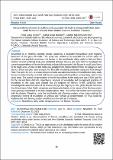| dc.description.abstract | Brucellosis is an endemic zoonotic disease caused by a facultative intracellular gram-negative bacterium of the genus Brucella. This study was carried out to establish the current status of brucellosis and possible associated risk factors in the smallholder dairy cattle in Hai and Meru District. A cross-sectional study was conducted between January and June 2022 to investigate the current seroprevalence of bovine brucellosis and possible associated risk factors in small dairy farms in the study areas. A total of 400 cattle was sampled with blood collected from 10 villages in each district. Blood samples were analyzed for Brucella circulating antibodies using the Rose Bengal Plate Test and c-ELISA. A structured questionnaire was administered to 200 smallholder dairy cattle farmers to determine the potential risk factors associated with brucellosis among dairy cattle in the study areas. The overall seroprevalence of bovine brucellosis in the study area was 0.50% and 0% for the Hai and Meru districts, respectively. Analysis of knowledge and management practices of brucellosis in the study area showed that the majority of farmers 74.5%, (149/200) were knowledgeable about the name of the disease; though, the majority 87.9%, (131/149) did not know the clinical signs. Most likely, awareness and biosecurity based on the nature of the farming system (zero grazing) contributed to the low seroprevalence; thus, none of the risk factors were associated with the disease. Therefore, under the smallholder dairy farming system, a four-stage roadmap for progressive control of brucellosis in animals and humans as recommended by FAO could be implemented with farming system modifications to eradicate the disease. | en_US |

